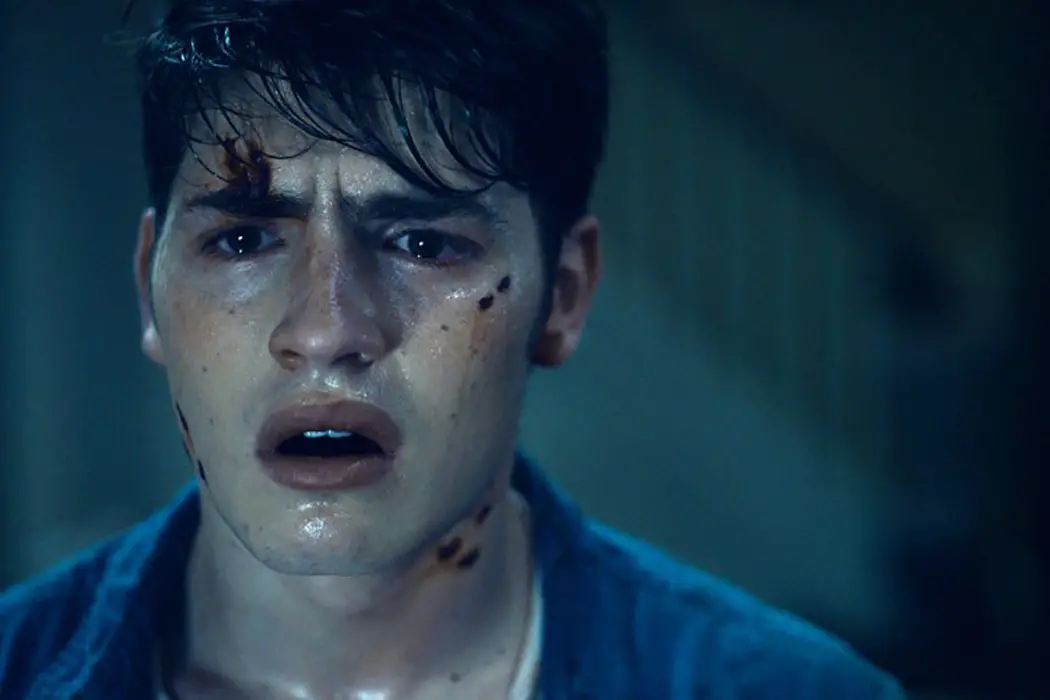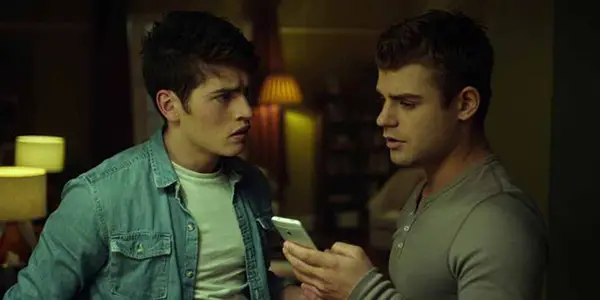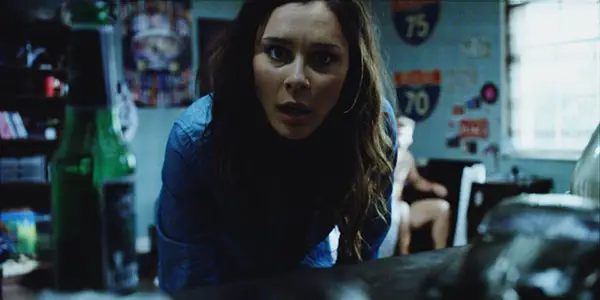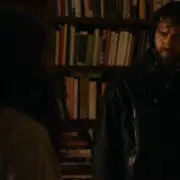DON’T HANG UP: Contemporary Horror At Its Simplest

Ryan has a degree in Film & TV Production. He…
Horror frequently has to toy with the idea of whether or not it wants to say anything of importance. Now, this can take on any number of forms. The Babadook, for example, is a thoughtful and poignant look at grief and depression, It Follows allows its demonic spirit to act as a metaphor for sexually transmitted diseases, and even lesser horror like the Saw franchise looks at all different kinds of societal issues and attempts to pick them apart. Don’t Hang Up, the debut feature from directors Alexis Wajsbrot and Damien Mace, feels like the kind of horror film that’s set up entirely to make a point. I mean, just get a load of its premise.
Sam (Gregg Sulkin) and Brady (Garrett Clayton) are best buddies who pass their time by recording themselves pranking people over the phone and posting the videos online. Soon, they go viral and ramp up the number of pranks they pull. One night, after Sam has a fallout with his girlfriend, Brady suggests a relaxing evening of prank calls and pizza, but before they can really kick the whole thing off, their phone rings. An unknown voice speaks to them, and it seems like this time Sam and Brady are on the other end of their favourite hobby.
On The Surface
Obviously things get a bit darker from here. After all, a film about one long prank call wouldn’t make for particularly compelling viewing. Don’t Hang Up feels primed, though, to make a point about social media and the concept of an online presence – there are even undertones of bullying and online abuse through its core. The issue is that it never fully commits to this. What we have is a film that should be fun and frightening and thoughtful, but that last part is really lacking.

Thankfully, Don’t Hang Up is genuinely good fun. Sam and Brady are likeable guys; they’re about as thinly sketched as most middle-tier horror characters, but they immediately come across as people you’d enjoy spending some time with. In other words, you won’t really care about them, but you won’t be egging them on to die every thirty seconds either. Sulkin‘s performance is impressive, too. He wrings a lot out of his empty character, and when the film does land on darker territory he handles the whole thing admirably. Clayton is less convincing and more uneven, but the likeability of his character prevents this from being too much of an issue.
Don’t Hang Up is also pretty brief. Not including the credits, the film clocks in at a meagre 76 minutes. It’s undoubtedly too short for the film to make any concise arguments about the digital era or online pranking, but it does allow a questionable premise to fit a feature length run-time. The film doesn’t get particularly violent until its final moments, meaning the bulk of Don’t Hang Up relies on atmosphere alone, and Wajsbrot and Mace show a real flare for this kind of filmmaking.
Technical Treats
Visually, their debut is a delight. The camera soars through keyholes to emphasise a lack of privacy and give a sense of insecurity to Sam’s house the moment we enter it. Our perspective repeatedly shifts from conventional filmmaking to digital camcorders and iPhone screens too, and it finds a nice balance within this. It means that Don’t Hang Up won’t get lulled in with the rest of the found footage tripe we get nowadays (nor does it deserve to, either), but still takes advantage of the technology around at present. A film about technology that fails to utilise technology would be tough to defend, so it’s assuring that Wajsbrot and Mace know how to incorporate this into their film without knocking it off balance.

The film’s reliance on atmosphere and tension is also effective. While a lot of impact is lost in its resolution when it eventually caves in to the violent tendencies it’s so desperately been trying to avoid for most of its run-time, Don’t Hang Up does succeed in crafting a good number of tense set-pieces throughout its middle act. It’s a film that screams “jump scares inbound by the shed-load!” but I’d be hard-pressed to name more than two times Don’t Hang Up resorts to this cheap trick. There’s a brilliant sequence at the end of the middle act in which the film drops at least three mini twists all within a few minutes of each other – they don’t exactly reshape the narrative, but they’re smart little jolts that keep you alert and stop your interest from slipping. Structurally and aesthetically, this is solid stuff.
A Lack of Intellect
However, the film is lessened by its refusal to look at some deeper themes. Don’t Hang Up can’t help but feel underwhelming in this sense when its premise is so clearly filled with thematic potential. Sam and Brady perform some pretty nasty pranks in the film’s earlier segments, and they certainly get their comeuppance for it, but there’s no real insight as to how either the victims or the perpetrators feel about any of it. A case could be made for Sam and Brady’s lack of discussion on the topic implying that all online pranksters care very little for their victims, but this feels incidental in the film. Don’t Hang Up could take some time to see how Sam’s love for this kind of thing upsets his girlfriend, or we could get an understanding as to whether Brady’s parents approve of what he does. Just something that demonstrates that the film is aware it’s depicting something very real and, in some cases, very serious.
There are a few other issues, too. Anyone paying even the smallest amount of attention can see the ending reveal coming a mile off – though the film does add one unexpected element to it that almost works to relieve you of your disappointment that you were indeed right the whole time – and the musical score is poorly executed far too often. For the most part, though, the film’s omission of any intellectual discussion of social media dangers and technological worries is its biggest letdown.
Don’t Hang Up is a fun and mostly effective little horror that holds your interest; it just doesn’t say as much as its premise suggests.
What do you think? Did Don’t Hang Up need a more thoughtful understanding of its modern themes, or did its atmosphere work well enough to make this irrelevant? Let us know in the comments!
Don’t Hang Up sees release in the US on February 10.
Does content like this matter to you?
Become a Member and support film journalism. Unlock access to all of Film Inquiry`s great articles. Join a community of like-minded readers who are passionate about cinema - get access to our private members Network, give back to independent filmmakers, and more.
Ryan has a degree in Film & TV Production. He has written about all things film and TV on his own blog, www.morrismovies.co.uk, for five years. His favourite film is Inception, as it's kind of the one that drew him into cinema in the first place. If you're one of those people who think Christopher Nolan is overrated, he probably doesn't like you. He isn't sorry.













